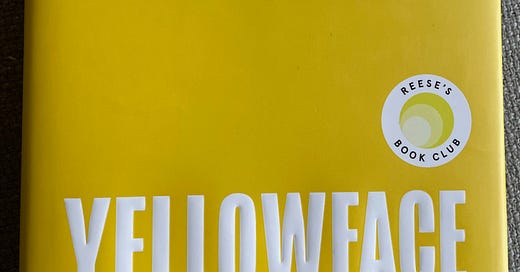A woman who has been a struggling writer for years finally writes a bestseller about World War I and Chinese laborers. Except it’s not clear that it’s written by her. When her friend Athena Liu died in front of her, our narrator, June Hayward (writing as Juniper Song) grabbed the manuscript that Athena had been working on, took it home, edited it, and found herself with a book that brings her a huge advance and lots of attention. The advance seems good, but the attention—that’s more complicated.
The book is about stealing, about fiction and non-fiction, and about authorial identities. June knows that she stole Athena’s manuscript, but she still thinks of the book as hers: Athena left parts unfinished; June wrote some of the book and did a lot of editing, reshaping the book and changing the order of its stories.
“June’s full of shit,” one of my book club friends said, “that’s Athena’s book, not hers.”
“I hope she gets caught,” another friend said.
________________________________
June finds herself pilloried on social media: she is accused of stealing the manuscript from Athena; of making herself seem Asian; of writing a book that puts forward racist stereotypes; of making money off Asian labor and suffering. She can’t stop doing what her publisher tells her not to do: reading the reviews and the comments that people post on Twitter. June wants to know what people are saying about her, even if it gives her anxiety attacks and enrages her. She decides that she can silence her critics by writing another book, which she does—except she uses the first paragraph of a story that Athena wrote. The new book doesn’t solve the problem and June finds that she has no ideas for another book. She is stuck. When her agent suggests that she sign on as a story writer for hire, June scoffs.
As she goes back over her relationship to writing and her friendship and competition with Athena June reveals that she thinks Athena is a thief, too: when June told Athena about her sketchy sexual experience with a fellow student Athena wrote June’s experience as a fictional story and had it published. When they went together to a museum, June watched Athena take the stories of Asian American service members and use them to build her fictional stories about Chinese forced labor in The Last Front.
____________________________
I have heard some writers say that all writers steal. This book focuses on the crimes and misdemeanors of theft: telling someone else’s story; stealing a manuscript; becoming a published and well-paid author as a result of telling the stories of suffering that haven’t been told before; creating a brand or persona that is meant to sell books or things and that emphasizes certain aspects of one’s identity while downplaying other aspects.
Are all of these forms of theft? Are some forms of theft justified by the ideal of truthfulness? Should stories be so tightly tied to their authors’ identity?
In the world of publishing that Kuang portrays, authors are more like celebrities and stories—even fictional ones—are evaluated by standards that seem more applicable to courtroom testimony than to art.
In his book Reality Hunger, David Shields wonders if readers want to find reality in stories because that desire is the only one that seems legitimate and justifiable. To treat all stories as journalistic pieces—to ferret out the truth behind the story and to think about stories in terms of ownership—this may be the thing that Yellowface criticizes more than anything else.




